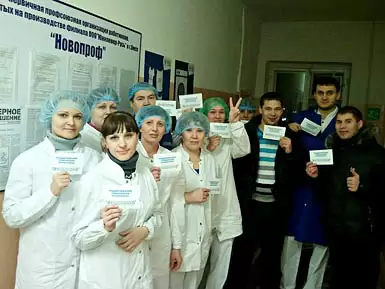Everything is “sustainable” but employment?

Unilever, who have a Sustainable Living Plan, a Sustainable Agriculture Code and a Sustainable Sourcing policy, among other things, have now launched a Sustainability Partnership logo for certain Knorr products starting in France and Germany. None of these contain a word about sustainable employment.
According to the food industry news site just-food, who interviewed Unilever’s food division president Antonie de Saint Affrique, “It’s going to be on given products because they are sustainably-made.”
Not really: on closer examination, the logo says nothing about the actual process by which the product was made: “You’ll have the logo and not the logo in the same country depending on whether the key ingredients are sustainably sourced or not”, de Saint Affrique told the interviewer.
Like all such schemes, the latest “sustainability” gimmick exploits the ambiguity of the label. So, for example “fair trade” sugar crushed in mills in Fiji occupied by the soldiers of a military dictatorship is marketed in the UK as “fairtrade”. Fairtrade International, which bestows the label, defends the practice on the grounds that the farmers who grow the cane have been certified as having met the fair trade criteria. They acknowledge trade union concerns about the Fiji dictatorship, but are not about to create a label designating the product as “grown and harvested under fair trade conditions, crushed in sugar mills under military occupation.”
Another example: the Knorr “Sustainability Partnership” hasn’t yet come to Greece, but the company’s operations in Gastouni, Unilever tells us, are “inspired by the Knorr vision of sustainable farming”. The company says it is working with farmers to reduce water consumption and promote organic mulching to replace plastic, but, 56% of the factory workers who make the consumer product are employed on precarious contracts with no job security This hardly qualifies as sustainable employment – is the labour behind the product not a “key ingredient”.
As elsewhere in Europe, Greece relies on exploited and abused migrants for the bulk of its agricultural work. Earlier this year, the topic briefly hit the news when a Greek strawberry farmer opened fire on 200 migrant strawberry pickers who demanded their wages after working for six months without pay. In agriculture, no certification scheme based on codes or audits can capture the reality of the situation. Child labour, among other abuses, is endemic throughout agriculture, a symptom of the poverty and degradation to which those who labour to feed the world are almost universally subjected. The IUF has encountered child labour on fairtrade certified tea plantations. The Rainforest Alliance, a key pillar of Unilever’s sustainable sourcing program, has served as a cover for union-busting on plantations (link).
What about the dwindling number of those who still work for Unilever, many of them on precarious agency or temporary contracts? Is their situation “sustainable”? Some 70,000 jobs have been eliminated in Europe alone over the past decade. Harald Wiedenhofer, general secretary of the IUF’s European regional organization EFFAT, commented on Unilever’s latest results that the company’s sustainable living program had proved sustainable for profits but not for employment.
Unilever corporate management has shown itself open to engagement with the IUF and its affiliates on reducing the number of precarious jobs, and there has been progress. However, precarious employment remains rampant within the Unilever system, and sustainable employment has yet to find a mention, let alone a defined function in the company’s varied sustainability schemes. Until that happens, unions have a fundamental obligation to highlight the absence of this key ingredient – and to fight for its inclusion. Nothing is sustainable without sustainable employment and rights at work.